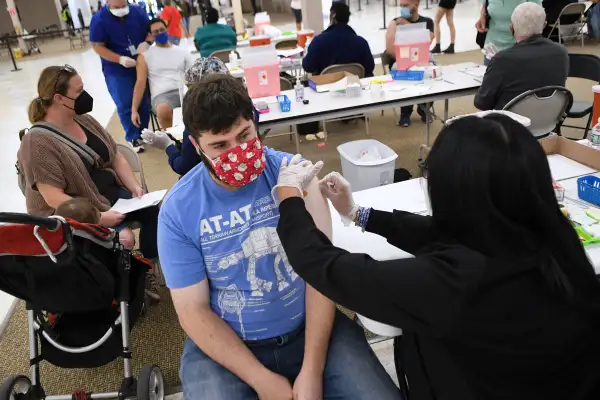True or False: You Can Be Denied Life Insurance if You Haven't Gotten a COVID-19 Vaccine

How should you shop for life insurance in an America that's rapidly becoming immunized against COVID-19? Sensibly -- by getting vaccinated as, or even before, you apply for a policy. That's despite advice to the contrary from some internet trolls.
Roughly a third of American adults have now received at least one vaccine dose, and President Biden has announced that all adults should be eligible for the vaccine by April 19. But that progress has spurred the spread of online misinformation suggesting that vaccination may hamper you in getting life insurance. There are also concerns of the opposite -- that not getting shots might be reason to be denied coverage.
Not every question about insurance and immunization can yet be answered definitively, since the industry is still processing what vaccination may mean for life insurance premiums and stipulations. But here’s what you need to know and do if you're looking for a policy now or soon.
Online falsehoods about vaccination and life insurance
Given the prevalence of anti-vaccination messages, it's hardly surprising that some who oppose COVID-19 immunization are disseminating myths about the effect of the shots on life insurance. Unsourced assertions floating around conspiracy-theory-laden corners of the Internet, and amplified by (largely anonymous) social media reposts, claim that people who get vaccinated against COVID-19 could be banned, now or in the future, from purchasing life insurance. Alternatively, the theory goes, death benefits might be taken away from those who have been vaccinated.
The theories are, of course, flat-out false. The industry’s trade group, the American Council of Life Insurers, issued a press release rebutting the untrue claims.
“Life insurers do not consider whether or not a policyholder has received a COVID vaccine when deciding whether to pay a claim,” the ACLI says in its statement.
“Life insurance policy contracts are very clear on how policies work, and what cause, if any, might lead to the denial of a benefit. A vaccine for COVID-19 is not one of them… Nothing has changed in the claims-paying process as a result of COVID-19 vaccinations.”
Steve Parrish, co-director of the Center for Retirement Income at the American College of Financial Services, suggests that the COVID-19 vaccine is currently likely to be a nonevent for most life insurance applicants.
“That’s not typically the kind of question a life insurance application would ask. Those kinds of things really don’t come up,” he says. Although life insurance underwriting does include a physical (either in-person or, since the pandemic, virtual) health exam, insurers generally don’t ask if people get vaccinated for, say, the flu or pneumonia.
Your vaccination in perspective
It’s not that insurers can’t ask about your vaccination status. “The question is certainly fair game,” he says — it’s just that receiving a COVID-19 vaccine is a relatively small data point when it comes to evaluating a person’s overall health and mortality risk. “It’s just too fine a detail for them to base pricing on,” Parrish says. “They’ll be looking at it as a macro issue, not per applicant.”
The one instance where vaccination might come into play is if a person applying for a life insurance policy has comorbidities that put them at a greater risk of dying from COVID-19 if they were to contract it, Parrish says. The combination of those other health issues plus the risk of COVID-19 could prompt insurers to look more favorably on an applicant who had been vaccinated.
“If it’s close, if they're underwriting a case and they're looking at medical history and if they're trying to decide, they would probably look favorably if a person has had a vaccination,” he says.
Cathy Seifert, an insurance analyst at CFRA Research, says pandemic-related claims questions are far more likely to crop up in other sectors of the insurance industry. “The bigger driver is in health insurance and disability pricing models,” she says.
Get vaccinated before you apply
Last year, some big life insurance companies pulled back on writing new policies for older Americans in response to myriad uncertainties about long-term effects of the pandemic combined with a punishing low-interest-rate environment that squeezed life insurers’ margins, Seifert says.
Like Parrish, she says there’s little chance that an otherwise-healthy person would be turned down for a policy just because they hadn’t received the COVID-19 vaccine, although she also predicts that insurers might have a positive view of COVID-19 vaccination on the margin. “If you’re thinking of getting life insurance, get yourself vaccinated first and then shop for it,” she recommends.
Life insurance became harder to price in the context of a novel coronavirus because there was no crystal ball, no long-term information available, Seifert says. Unlike, say, car insurance, life insurance policies aren’t repriced from year to year in response to fluctuations in risk factors. Insurers have to rely on long-range actuarial models — models that COVID-19 threw for a loop.
The jury is also still out on a related question: How carriers will handle underwriting for people who have had, and recovered from COVID-19. “I anticipate it will probably be a factor in life insurance underwriting,” Seifert says, but she adds that state insurance commissioners will likely be quick to crack down on anything that resembles the price-gouging of COVID-19 survivors.
“My sense is regulators are going to be highly sensitive to onerous pricing methodologies,” she says.
